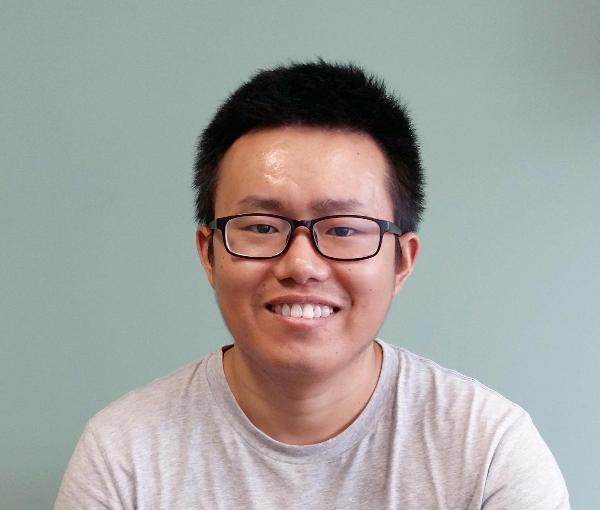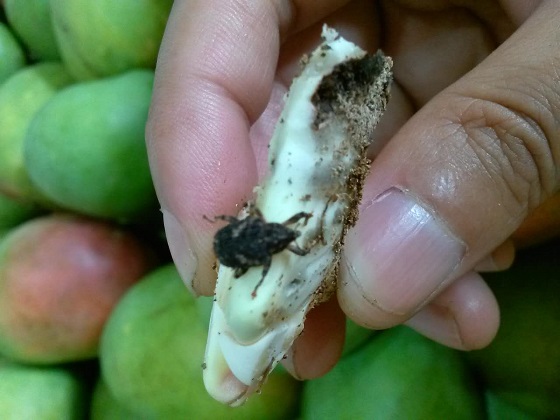Create your own opportunities

It’s 6.55am on a March morning. A figure stands on the edge of a platform, waiting. The sun is already bright and the day surprisingly warm given that it’s still early. After a few moments, the peaceful silence is broken by the sound of an approaching engine, far away, but growing louder as the large truck draws closer. As it takes the last corner and rolls into sight, the engine is momentarily drowned out by voices calling morning greetings. As if in response, a whir of activity begins.
The figure is Shoufeng Cao, a PhD student in The University of Queensland’s School of Agriculture and Food Science. He is standing on a loading dock in Rocklea waiting for a delivery of mangoes that is being trucked in from a grower up north. This has been his morning routine for the last two months. It’s a long way from his research desk at The University of Queensland, and even further from his home in China. Shoufeng is a little over halfway through his PhD, and is nearing the end of a two month stint with Alfred E Chave, a fresh produce supplier and distributor. During his two months with Chave, Shoufeng has mapped the business and value chain processes, which is improving relationships with their industry partners. Shoufeng hopes to continue working with Chave to strengthen their risk analysis and management processes.
It is becoming increasingly common to find PhD students and graduates outside the walls of the university1,2. As academics, industry leaders and graduate destination surveys will tell you, the times are changing. Getting a job in academia might be a dream for many, but it becomes reality for few.
Over half of all PhD graduates are stepping away from the pursuit of traditional academic careers and looking for employment elsewhere3. The low number of tenured academic positions available is one reason for this, but it would be wrong to assume that HDR graduates only seek employment outside of the walls of the university when they can’t secure an academic position.
The new wave of PhD graduates does not see working in industry as a consolation prize. More and more students such as Shoufeng are commencing their research higher degrees with the intention of working in industry after graduation. There are several reasons this might be the case, including better availability of positions, a more attractive pay scale, better prospects for career advancement and a more manageable workload4.
Through initiatives such as placements programs for research higher degree students, research training providers are beginning to recognise the need to help students navigate the gap between their research skills and the skills required by potential employers outside academia. Employers in industry have cited business acumen and real life experience along with skills in team work, project management and organisation as essential attributes for future employees.
The University of Queensland’s placement program assists students to develop and demonstrate these transferrable skills during their research higher degrees.

Industry leaders are becoming increasingly aware of the value of research higher degree qualified employees, and Shoufeng’s placement came about through a combination of this awareness and good fortune. “I was at a National Export and Innovation Conference in Toowoomba. It was an industrial conference. I was invited to attend by Kalfresh. There we had a preliminary discussion about my project. In a morning tea break, I met the director of Alfred E Chave. We began talking about my research and how it could be applied to the horticulture industry,” says Shoufeng.
Central to Shoufeng’s successful placement was the support of his two academic supervisors from the School of Agriculture and Food Science, and the School of Business. This meeting of disciplines and support of an industry placement proved to be a recipe for success. As Shoufeng puts it, “during my first year, I worked on getting a strong theoretical background. Then my supervisors pushed me to also get some practical experience.” This practical experience will help Shoufeng to demonstrate how his research has real world relevance and can benefit industry.
At the end of the two months, Shoufeng’s project supervisor, Anthony Joseph noted “The depth of Shoufeng’s industry specific knowledge is exceptional. Subsequently all communication was meaningful and to the point.” With such a positive response, it is no wonder that Anthony sees benefit in future collaborations. “I feel there will be scope for further work for Shoufeng at Alfred E Chave in the future.” Given the success of experiences such as Shoufeng’s, there is a great opportunity for UQ to contribute to the future direction of research training.
References
- OECD (2012), Transferable Skills Training for Researchers: Supporting Career Development and Research, OECD Publishing. http://dx.doi.org/10.1787/9789264179721-en
- UQ Graduate School (2015), UQ Graduate School Research Candidate Survey. The University of Queensland.
- The Royal Society (2010), The Scientific Century: Securing our future prosperity, The Royal Society. https://royalsociety.org/
- Edwards, D. (2011), Where are the academics of tomorrow? Supply and demand issues for Australian universities. http://research.acer.edu.au/joining_the_dots/28
- The Allen Consulting Group (2010), Employer demand for researchers in Australia, Report to the Department of Innovation, Industry, Science and Research.
